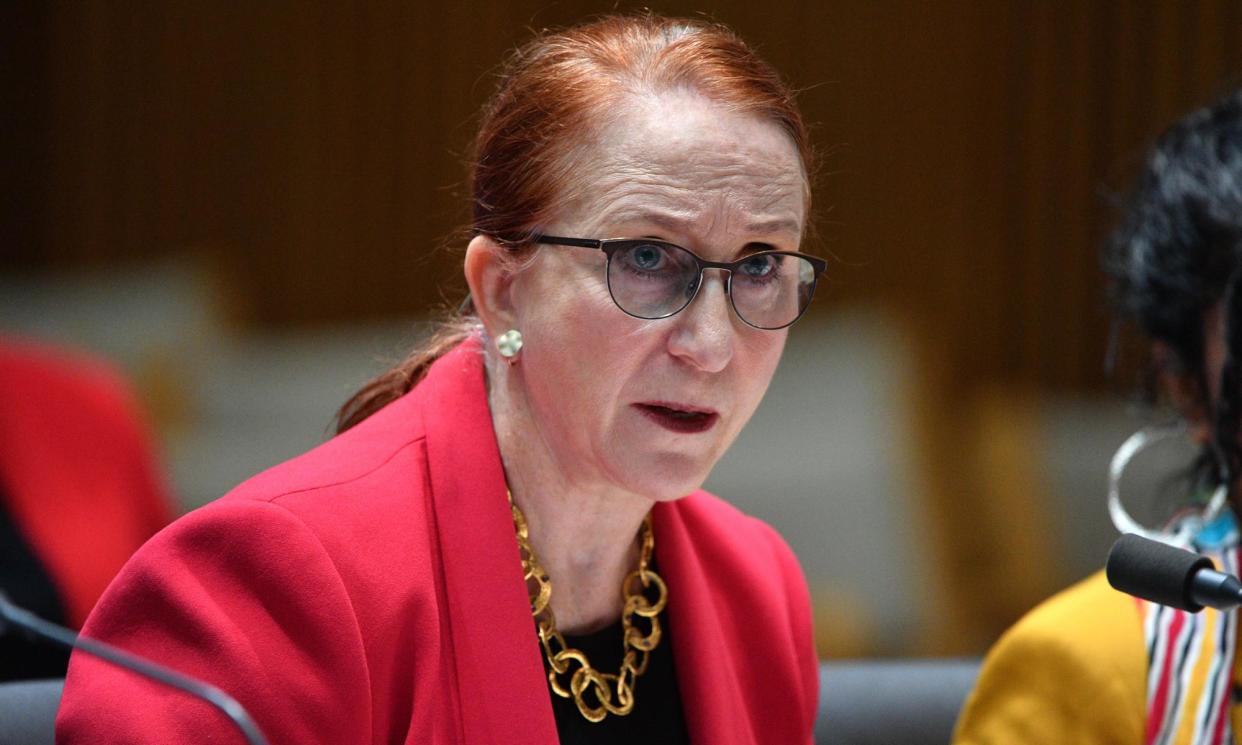Australian Human Rights Commission chief denies staff sanctioned for expressing pro-Palestinian views

The president of the Australian Human Rights Commission has denied that staff have been sanctioned over expressing pro-Palestinian views, after staff wrote a letter stating the commission’s response on the Israel-Gaza war was inadequate.
Guardian Australia revealed last week that at least 24 staff across eight teams at the commission wrote anonymously to Rosalind Croucher at the end of January expressing “frustration at the commission’s failure to fulfil its mandate as an accredited national human rights institution in regard to Israeli war crimes and crimes against humanity perpetrated against Palestinians in Gaza and the West Bank”.
In the letter, which was tabled in parliament in a Senate estimates hearing on Tuesday night by the Greens’ justice spokesperson, David Shoebridge, staff said they had “chosen to remain anonymous due to the culture of silence at the commission”.
“We have witnessed staff who take a rights-based approach to this issue be cautioned and disciplined,” the staff said.
“We also note the lack of safe channels for concerns to be discussed without fear of adverse action and the impact this has had on our wellbeing and psychosocial safety.”
Croucher said she was “deeply concerned” staff felt the need to write an anonymous letter.
“Our focus has been to understand the motivation, the disappointment, to assure staff that our concern for their wellbeing is of paramount concern,” she told Senate estimates.
Croucher denied staff had been sanctioned or had actions taken against them for signing pro-Palestinian petitions, or wearing keffiyehs to work, but said the commission’s CEO and the union had reminded staff of “the importance of being apolitical and impartial”
Croucher said public servants had constraints under the code of conduct and that it was “concerning and disappointing” staff wrote an anonymous letter that resulted in media coverage.
“It was not a matter we discussed internally, it was just raised externally through the Guardian newspaper. And that shocked a lot of the staff who were not part of that group,” she said.
“We had people asking: ‘What’s going on?’ They were terribly concerned to see the commission written about in that way in the paper.”
During the Senate estimates exchange, Shoebridge asked whether Croucher’s response to his questions “challenging the reasons for anonymity, challenging the validity of the statement that it comes from a collective of concerned staff from across eight teams” might be received by staff who could perceive it as questioning their integrity.
Croucher replied that she did not accept the premise of “a number of points you’ve raised with me” and that there had been several communications from her to staff expressing concern about the impact of the situation in the Middle East.
In the letter, staff expressed concern that an opinion piece by commissioner Lorraine Finlay in 2022 about the Ukraine war had been stronger in its language in support of Ukraine than any material released the commission about the Israel-Gaza war.
Croucher said it was an opinion piece by a single commissioner, while the collective group of commissioners worked to develop a consensus to put out a statement as commissioners as a whole.
“But there are times when commissioners seek to express their opinions, usually through the vehicle of an opinion piece on issues that particularly fall within their portfolios or on which they have a particular view. So there is a clear distinction.”
Croucher acknowledged that “some within the commission would have preferred us to be stronger on various issues. And the position that the commission has reached as a group may not always align with the position that some of our staff would like us to take”. But she said the commission had issued several clear statements calling for respect for human rights, right to freedom of assembly, protection of civilians and the provision of humanitarian aid to the people of Gaza and the return of all civilian hostages.
The commission’s strongest statement, issued in response to the international court of justice’s ruling on Israel’s actions in Gaza, was published a day after the concerned staff sent their letter to Croucher.


